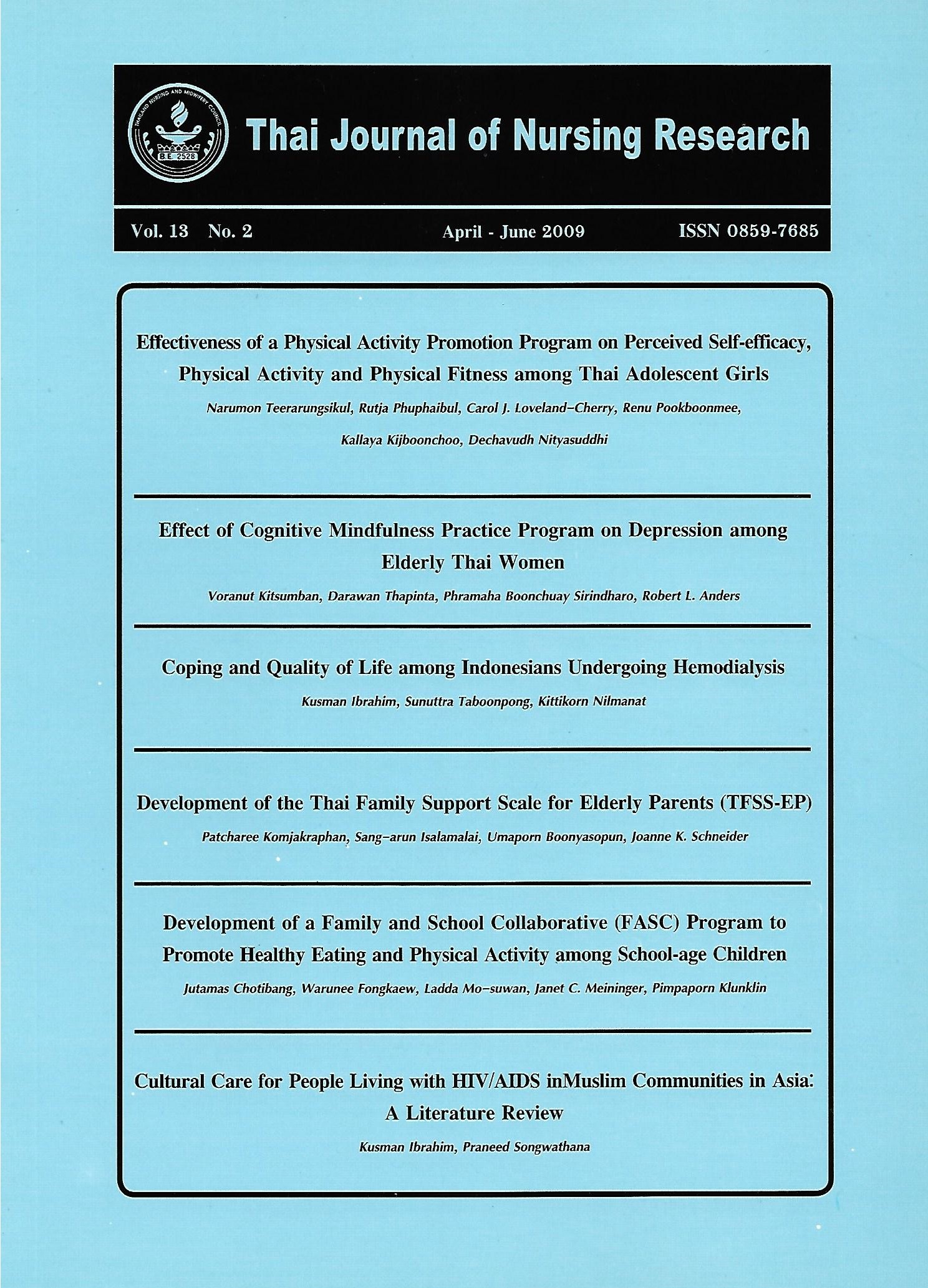Effect of Cognitive Mindfulness Practice Program on Depression among Elderly Thai Women
Keywords:
โปรแกรมการบำบัดทางสติและปัญญา, ผู้หญิงไทยสูงอายุ, ภาวะซึมเศร้า, cognitive mindfulness practice program, depression, elderly Thai womenAbstract
บทคัดย่อ
ภาวะซึมเศร้าเป็นปีญหาทางสุขภาพจิตที่สำคัญอย่างยิ่งในปัจจุบันและเป็นสาเหตุสำคัญของความทุกข์และความสูญเสียความสามารถโดยเฉพาะในผู้สูงอายุ ผู้หญิงไทยสูงอายุมีโอกาสเสี่ยง ต่อภาวะซึมเศร้ามากกว่าผู้ชาย การวิจัยครั้งนี้เป็นการวิจัยเชิงทดลองแบบสองกลุ่มเพื่อศึกษาผลของโปรแกรมการบำบัดทางสติและปัญญาต่อภาวะซึมเศร้าในผู้หญิงไทยสูงอายุที่มีภาวะซึมเศร้าในระดับปานกลางและต่ำ โดยเปรียบเทียบกับผู้หญิงไทยสูงอายุที่ไดัรับการดูแลตามปกติในชุมชนจังหวัดเชียงใหม่ โดยสุ่มกลุ่มตัวอย่างเข้ากลุ่มทดลองและกลุ่มควบคุม
กลุ่มทดลองได้รับโปรแกรมการบำบัดทางสติและปัญญาที่ผู้วิจัยสร้างขึ้น สำหรับกลุ่มควบคุมได้รับการดูแลด้านจิตใจและได้รับการพยาบาลตามปกติจากพยาบาลชุมชน กลุ่มตัวอย่างได้รับประเมินระดับความรุนแรงของภาวะซึมเศร้าก่อนการทดลอง หลังเข้าร่วมโปรแกรมทันที และ 3 เดือนหลังเข้าร่วมโปรแกรมวิเคราะห์ข้อมูลโดยใช้สถิติบรรยาย การวิเคราะห์ความแปรปรวนแบบสองทางเมื่อมีการวัดซ้ำ การทดสอบค่าเฉลี่ยสองกลุ่มอิสระต่อกันและการวิเคราะห์ความแปรปรวนร่วม
ผลการวิจัยพบว่าหลังเข้าร่วมโปรแกรม และ 3 เดือนหลังเข้าร่วมโปรแกรม กลุ่มทดลองที่ได้รับโปรแกรมการบำบัด ทางสติและปัญญามีภาวะซึมเศร้าลดลงอย่างมาก เมื่อเปรียบเทียบกับกลุ่มที่ไม่ได้รับโปรแกรม ผลการวิจัยครั้งนี้แสดงให้เห็นว่า โปรแกรมการบำบัดทางสติและปัญญาสามารถลดภาวะซึมเศร้าในผู้หญิงไทยสูงอายุ พยาบาลที่มีความรู้ และผ่านการฝึกอบรมสามารถใช้โปรแกรมการบำบัดทางสติและปัญญาซึ่งเป็นการบำบัดโดยไม่ใช้ยาและเหมาะสมกับวัฒนธรรมสำหรับการบำบัดผู้หญิงไทยสูงอายุที่มีภาวะซึมเศร้าในระดับปานกลางและตํ่า
คำสำคัญ: โปรแกรมการบำบัดทางสติและปัญญา ผู้หญิงไทยสูงอายุ ภาวะซึมเศร้า
Abstract
Depression is a leading mental health problem and a significant contributor to human suffering and disability, especially among the elderly. Elderly women are known to be more prone to depression than are men. Using a two group, pretest-posttest, control group design, this study sought to determine if a cognitive mindfulness practice program reduced depression among elderly Thai women, with mild to moderate depression, receiving care at a community center in Chiang Mai. Participants were randomly assigned to either the experimental or control group.
The experimental group participated in a cognitive mindfulness practice program developed by the primary researcher. The control group received typical emotional support and nursing care from community nurses at the community center. Each participant’s level of depression was assessed: (a) prior to the start of the program’s protocol; (b) upon program completion; and, (c) three months thereafter.
Data were analyzed using descriptive statistics, two-way mixed-design ANOVA, independent sample t-test and ANCOVA.
Those who participated in the cognitive mindfulness practice program, compared to those who did not participate in the program, had a greater decrease in depression scores upon completion of the program and three months after completion of the program. Findings suggest the program may have contributed to changes in the level of depression among those who participated in the program. Nurses educated, and trained, in the use of the cognitive mindfulness program, potentially, could provide a non-biological, culturally appropriate intervention for the treatment of mild to moderate depression among elderly Thai women.
Keywords: cognitive mindfulness practice program, depression, elderly Thai women
Downloads
How to Cite
Issue
Section
License
Copyright: The Pacific Rim International Journal of Nursing Research, Thailand Nursing & Midwifery Council has exclusive rights to publish, reproduce and distribute the manuscript and all contents therein.







.png)


